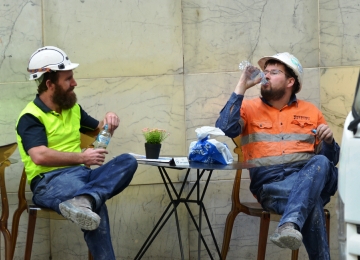11 July 2017
 New research from the University of South Australia has shown the MATES in Construction (MIC) program, designed to turn around the very high incidence of suicide in the construction industry, is having an impact.
New research from the University of South Australia has shown the MATES in Construction (MIC) program, designed to turn around the very high incidence of suicide in the construction industry, is having an impact.
The report released this week, which surveyed a sample of construction industry workers in South Australia and followed up with qualitative interviews in a subset of the group, found that the training and support provided through the MIC program was making it easier for people to discuss problems and share feelings.
MIC was established to reduce the rate of suicide in the construction industry, which is almost five times higher than in the general population.
The alarming statistic is thought to relate to a range of issues and stresses including the insecurity of work in construction, the prevalence of substance abuse among construction workers, the hyper-masculine environment that has traditionally seen help-seeking as weak, bullying, the stress of long work hours and relationship breakdowns.
Researchers at UniSA found programs introduced to provide worker education and training around the issues of suicide and suicide prevention - General Awareness (GAT) and Connector Training – were having a real impact with 50 per cent of the workers surveyed reporting they had used what they had learned at work and in life outside of work.
Lead researcher on the project from UniSA’s Mental Health and Substance Use Research Group, Dr Monika Ferguson says the results are quite promising.
“We found that workers were not only using what they learned in the program to communicate with mates at work, but they were also applying their new knowledge and skills when communicating with their families and loved ones,” Dr Ferguson says.
“It was also useful for them in raising issues around work related stress. However, fewer participants reported using the training to talk directly about drug and alcohol related issues, financial pressures or suicidal thoughts.
“The big take home message is that well-structured and targeted education programs, even short ones such as the 45 minute GAT program, are helping to change the way workers see the role of communication and support in preventing suicide.
“The qualitative research showed in many instances that respondents had developed a heightened awareness for recognising the signs when someone is having a tough time, and had broken through previous reserve to offer support to mates and loved ones by asking clear questions such as ‘are you thinking about taking your life?’.”
Dr Ferguson says the MATES in Construction program is not only raising awareness about suicide and issues specific to the construction industry but it is also giving workers the tools to support colleagues who might be struggling with the mental health issues and stresses that can lead to suicide.
“Our evidence shows that this program is achieving the desired effect,” Dr Ferguson says.
“It also supports the notion that expanding the program and diversifying the content so that it has meaning in various work and cultural contexts may be of benefit.”
South Australian CEO of the MIC program, Michelle Caston says the research shows that the program is having real impact.
“Our long-term goal is to change the culture of the industry so that it is safe to talk about problems, it is smart to ask for help and checking in with your mates to make sure they are OK, is just what you do,” Caston says.
“If we can transform the culture, we know this program will improve work safety and productivity and ultimately save lives.”
*If you are needing support or this article has raised concerns for you please ring MIC on 1300642111*
Media contact: Michèle Nardelli mobile 0418 823 673 email michele.nardelli@unisa.edu.au




